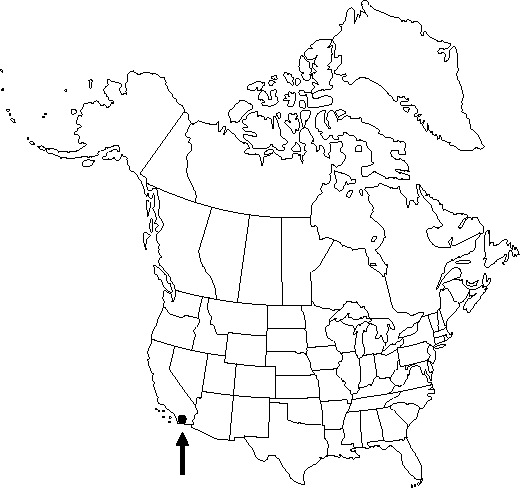Difference between revisions of "Delphinium hesperium subsp. cuyamacae"
Brittonia 8: 11. 1954.
FNA>Volume Importer |
imported>Volume Importer |
||
| (7 intermediate revisions by 2 users not shown) | |||
| Line 15: | Line 15: | ||
|label=Endemic | |label=Endemic | ||
}} | }} | ||
| − | |basionyms={{Treatment/ID/ | + | |basionyms={{Treatment/ID/Basionym |
|name=Delphinium cuyamacae | |name=Delphinium cuyamacae | ||
|authority=Abrams | |authority=Abrams | ||
| + | |rank=species | ||
| + | |publication_title=Bull. Torrey Bot. Club | ||
| + | |publication_place=32: 538. 1905 | ||
}} | }} | ||
|synonyms= | |synonyms= | ||
| Line 27: | Line 30: | ||
}}<!-- | }}<!-- | ||
| − | --><span class="statement" id="st- | + | --><span class="statement" id="st-undefined" data-properties=""><b>Stems </b>proximally puberulent with arched hairs. <b>Inflorescences</b> generally more than 25-flowered, dense; pedicel ascending. <b>Flowers</b>: sepals dark blue-purple, spreading to erect, lateral sepals 7-10 mm, less than 4(-5) mm wide, spurs 8-12 mm; lower petal blades 3-5 mm. <b>Fruits</b> 2.2-2.5 times longer than wide. <b>2n</b> = 16.</span><!-- |
-->{{Treatment/Body | -->{{Treatment/Body | ||
| Line 35: | Line 38: | ||
|distribution=Calif. | |distribution=Calif. | ||
|discussion=<p>Of conservation concern.</p><!-- | |discussion=<p>Of conservation concern.</p><!-- | ||
| − | --><p>Delphinium hesperium subsp. cuyamacae is local near Cuyamaca Lake. Although it has been reported also from Mt. Palomar, specimens have not been seen.</p><!-- | + | --><p><i>Delphinium hesperium </i>subsp.<i> cuyamacae</i> is local near Cuyamaca Lake. Although it has been reported also from Mt. Palomar, specimens have not been seen.</p><!-- |
| − | --><p>No other Delphinium with similar features grows in the region where D. hesperium subsp. cuyamacae grows. Superficially, specimens of this taxon resemble those of some D. hansenii subsp. hansenii. Seeds are quite different, as are pubescence patterns and venation on abaxial surface of leaves. Delphinium parryi occurs near D. hesperium subsp. cuyamacae; flowers of D. parryi in that area are much larger and more widely spaced on the inflorescence than in D. hesperium subsp. cuyamacae.</p> | + | --><p>No other <i>Delphinium</i> with similar features grows in the region where <i>D. hesperium </i>subsp.<i> cuyamacae</i> grows. Superficially, specimens of this taxon resemble those of some <i>D. hansenii </i>subsp.<i> hansenii</i>. Seeds are quite different, as are pubescence patterns and venation on abaxial surface of leaves. <i>Delphinium parryi</i> occurs near <i>D. hesperium </i>subsp.<i> cuyamacae</i>; flowers of <i>D. parryi</i> in that area are much larger and more widely spaced on the inflorescence than in <i>D. hesperium </i>subsp.<i> cuyamacae</i>.</p> |
|tables= | |tables= | ||
|references= | |references= | ||
| Line 45: | Line 48: | ||
-->{{#Taxon: | -->{{#Taxon: | ||
name=Delphinium hesperium subsp. cuyamacae | name=Delphinium hesperium subsp. cuyamacae | ||
| − | |||
|authority=(Abrams) H. F. Lewis & Epling | |authority=(Abrams) H. F. Lewis & Epling | ||
|rank=subspecies | |rank=subspecies | ||
| Line 60: | Line 62: | ||
|publication year=1954 | |publication year=1954 | ||
|special status=Conservation concern;Endemic | |special status=Conservation concern;Endemic | ||
| − | |source xml=https:// | + | |source xml=https://bitbucket.org/aafc-mbb/fna-data-curation/src/2e0870ddd59836b60bcf96646a41e87ea5a5943a/coarse_grained_fna_xml/V3/V3_776.xml |
|genus=Delphinium | |genus=Delphinium | ||
|section=Delphinium sect. Diedropetala | |section=Delphinium sect. Diedropetala | ||
| Line 66: | Line 68: | ||
|species=Delphinium hesperium | |species=Delphinium hesperium | ||
|subspecies=Delphinium hesperium subsp. cuyamacae | |subspecies=Delphinium hesperium subsp. cuyamacae | ||
| − | |||
| − | |||
| − | |||
| − | |||
| − | |||
| − | |||
| − | |||
| − | |||
| − | |||
| − | |||
| − | |||
| − | |||
| − | |||
}}<!-- | }}<!-- | ||
-->[[Category:Treatment]][[Category:Delphinium hesperium]] | -->[[Category:Treatment]][[Category:Delphinium hesperium]] | ||
Latest revision as of 22:51, 5 November 2020
Stems proximally puberulent with arched hairs. Inflorescences generally more than 25-flowered, dense; pedicel ascending. Flowers: sepals dark blue-purple, spreading to erect, lateral sepals 7-10 mm, less than 4(-5) mm wide, spurs 8-12 mm; lower petal blades 3-5 mm. Fruits 2.2-2.5 times longer than wide. 2n = 16.
Phenology: Flowering early summer.
Habitat: Grassland, open pine woods
Elevation: 1100-1500 m
Discussion
Of conservation concern.
Delphinium hesperium subsp. cuyamacae is local near Cuyamaca Lake. Although it has been reported also from Mt. Palomar, specimens have not been seen.
No other Delphinium with similar features grows in the region where D. hesperium subsp. cuyamacae grows. Superficially, specimens of this taxon resemble those of some D. hansenii subsp. hansenii. Seeds are quite different, as are pubescence patterns and venation on abaxial surface of leaves. Delphinium parryi occurs near D. hesperium subsp. cuyamacae; flowers of D. parryi in that area are much larger and more widely spaced on the inflorescence than in D. hesperium subsp. cuyamacae.
Selected References
None.
